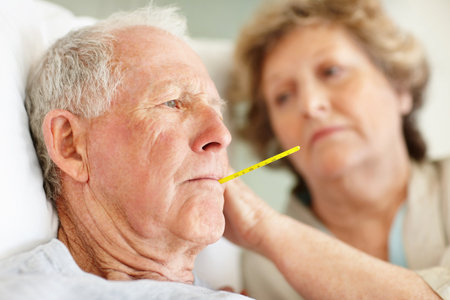The Art of Aging Well
We provide customized hourly and around-the-clock care to older adults so they can live happier, healthier lives at home.
Download
Pneumonia is an acute inflammation of the alveolar spaces of the lungs. It causes the alveoli in the lungs to fill with infective exudate, and secretions. There are many different kinds of pneumonia. The elderly are more susceptible to pneumonia for many reasons. They already suffer from a multitude of conditions that can include heart disease, dementia, diabetes, viral respiratory infections, chronic respiratory infections, smoking, malnutrition, cancers, and other illnesses that make an older person’s immune system response and defences much weaker.
 Pneumonia can be caused by more than thirty types of organisms and different strains, which means that symptoms can vary from case to case. Symptoms of pneumonia include fever, cough, green or yellow sputum, chest pain, stabbing chest pain, malaise, weakness, chills, blood-speckled or pink sputum, gastrointestinal symptoms like nausea and vomiting, diarrhea, shortness of breath, lethargy, loss of appetite, and dizziness. Initially, the cough tends to be dry and hacking, but later the cough becomes productive with chest pain. There may be crackles and rales heard in the chest and upon breathing. Frequently, the history will reveal that the patient had a recent viral or respiratory illness, or a cold.
Pneumonia can be caused by more than thirty types of organisms and different strains, which means that symptoms can vary from case to case. Symptoms of pneumonia include fever, cough, green or yellow sputum, chest pain, stabbing chest pain, malaise, weakness, chills, blood-speckled or pink sputum, gastrointestinal symptoms like nausea and vomiting, diarrhea, shortness of breath, lethargy, loss of appetite, and dizziness. Initially, the cough tends to be dry and hacking, but later the cough becomes productive with chest pain. There may be crackles and rales heard in the chest and upon breathing. Frequently, the history will reveal that the patient had a recent viral or respiratory illness, or a cold.
Simple diagnostic tests can confirm a case of pneumonia in the elderly. A doctor listening to the senior’s lungs may hear crackling, bubbly sounds, rales, and rattling sounds, which signal infection and inflammation. A chest x-ray or a CT scan can confirm the diagnosis. As well, a doctor may check the pulse oximetry to see what the senior’s blood oxygen levels are. Phlegm can also be analyzed in a lab to reveal which bacteria is growing. The elderly are more likely to catch streptococcal pneumonia which can come on slowly or suddenly and furthermore may damage the lungs and cause toxemia in the bloodstream.
Treating pneumonia in the elderly depends on the organism that has triggered the infection. If the senior has viral pneumonia, they may be prescribed antiviral drugs. Hydration and eating well are of utmost importance. Bacterial pneumonia must be treated with antibiotics. If the senior is in the hospital they may also require oxygen and intravenous antibiotics as well as puffers to ease the breathing discomfort. At times a low dose cough suppressant can help to reduce coughing so the patient may sleep overnight.
Prevention of pneumonia in the elderly can include the pneumococcal vaccine, influenza vaccine, proper hand washing, good dental hygiene, exercise, rest, healthy drinking and eating. As well, they should stay away from anyone who has had a cold or a flu.
It is always preferable to prevent rather than to treat pneumonia. Immediate attention if one suspects that a senior has pneumonia can be lifesaving.

Get Started With a Free Consult